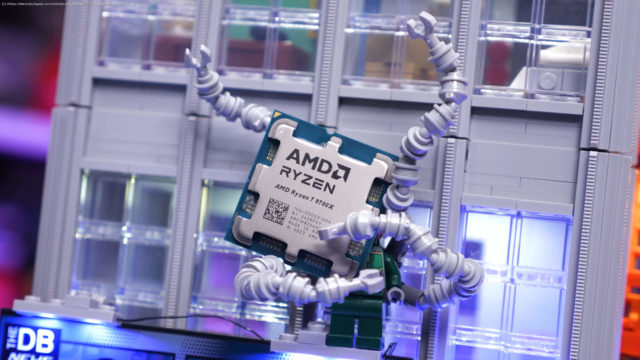We’ve tested the Ryzen 7 5800X3D with Windows 11 24H2 and compared it to the new Ryzen 7 9700X. This review dives into performance data across patched.
Many readers have been asking for Windows 11 24H2 testing with the Ryzen 7 5800X3D, so we’ve worked hard to make that happen. In this review, we’ll be examining that data and comparing it with the new Ryzen 7 9700X. As always, there’s a lot of data to cover, but before diving in, let’s go over a few important details about the testing process.
Initially, we had benchmarked both CPUs using the Insider Preview build of Windows 11 24H2, as it was the only version available at the time. However, just as we were finalizing the data, Microsoft officially released 24H2. Rather than pushing out what we had, we decided to download the official 24H2 version and start fresh, which is exactly what we did and that’s the results we’ll be showing you today.
In this benchmark review, we’ll be comparing the 5800X3D and 9700X using the patched version of 23H2 as well as the newly released 24H2 build. The newer Ryzen chip was tested using the latest BIOS revision featuring AGESA 1.2.0.2.
And while this enables the optional 105W mode, we’ve stuck with the default 65W mode for this testing. This approach makes the most sense – not only because it’s how the processor was advertised, but also because it offers the best balance between performance and power.
Then the 5800X3D was benchmarked on the MSI MPG X570S Carbon Max WiFi using BIOS version 7D52v1B1, which is based on AGESA 1.2.0.Cc.
Now, let’s get into the results…
While Star Wars Outlaws may have been a flop, it’s an excellent test for CPU gaming performance from a technical standpoint. This is a particularly CPU-demanding title, especially in the NPC-heavy section we’re using for testing.
Here, the 5800X3D is 9% slower than the 9700X. Although this isn’t a huge margin, the difference is noticeable when considering high refresh rate performance, as the frame rate increases from 117 fps to 128 fps. That said, for an older product, the 5800X3D’s performance remains impressive, even when compared to the 9700X.
Space Marine 2 is another new game, and while it was well received, we’re including it in this benchmark because it’s a very CPU-heavy title. Interestingly, the 23H2 patch didn’t fully resolve the performance issues this game faced on Windows 11. However, the 24H2 build boosts performance significantly for both CPUs by about 9%. Despite this improvement, the 5800X3D is still 7% slower than the 9700X on 24H2.
Hogwarts Legacy is a modern game that’s both CPU and memory-intensive, with DDR5 providing a clear advantage here. The 9700X scales better with 24H2, resulting in 14% more performance compared to the 5800X3D, though the improvement to the 1% lows is a more modest 9%.
Next up is Assetto Corsa Competizione, where we observed a 3-5% performance uplift with 24H2 over the patched 23H2. This game was a significant outlier for Zen 5, showing the largest gains for the 9700X over the 7700X.
We believe this is due to the increased L1 cache capacity of Zen 5, as this title is extremely cache-sensitive. As a result, 3D V-Cache also boosts performance significantly, leading to very competitive results between the 5800X3D and 9700X, with the older Zen 3 CPU outperforming by 3%.
The 5800X3D excels in Spider-Man Remastered, rendering an average of 187 fps, which is 13% faster than the 9700X. However, the two CPUs are more evenly matched when comparing the 1% lows.
Homeworld 3 performance was addressed with the 23H2 patch, which aligns it with the 24H2 results. Both the 5800X3D and 9700X deliver the same level of performance, making them evenly matched in this game.
In A Plague Tale: Requiem, the 9700X is significantly faster than the 5800X3D, offering a 13% performance boost.






